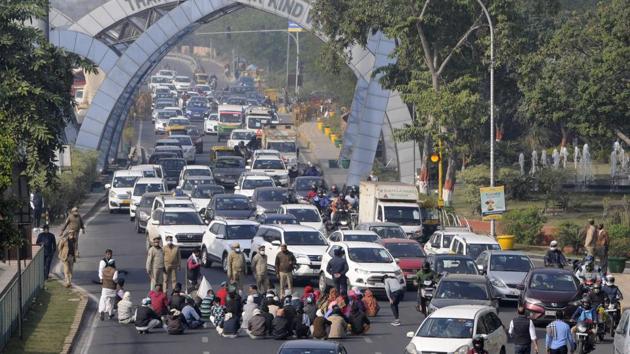The perils of a prolonged deadlock with farmers
Prolonged blockages of the main arteries of the NCR can have a serious adverse effect on people already reeling from the pandemic and economic distress
“I belong to a farmer’s family and since childhood, I have experienced the tough life of farmers…a lie is being spread these days in the name of MSP and mandis”. This was part of a letter by Union agriculture minister, Narendra Singh Tomar, reaching out to the agitating farmers. The farm groups rejected the overture. Who will blink first? Past experience shows that prolonged protests can lead to great instability.

A three-judge Supreme Court (SC) bench headed by the Chief Justice observed that if the issue is not resolved quickly, the protest could spread to other parts of the country. The SC also said that it cannot take away the right to express disagreement from anyone unless it impedes the rights of others. This is why it has asked for the matter to be listed before the vacation Bench. The SC has also asked the Attorney General (AG) whether the government could put these laws on hold for a few days to which he has said he would seek the government’s view. The SC has also suggested the setting up of an independent committee to enable discussions; this gives the government some space.
The farmers, however, are asking the Centre to settle the issue — they want nothing less than a repeal of the three laws. The government had earlier suggested some amendments but this has not met with favour from the farmers. If both sides refuse to be flexible, this deadlock is likely to be prolonged.
The main problem created by this stir is that fact that the four entry points to Delhi are either completely closed or partially blocked. Millions of people have to travel daily to Delhi or to the National Capital Region (NCR) for work. Now their mobility has been curtailed. During the Shaheen Bagh agitation last year, only one road was closed. Prolonged blockages of the main arteries of the NCR can have a serious adverse effect on people already reeling from the pandemic and economic distress. Traders in Delhi and NCR have already begun to feel the pinch. The movement of fruits and vegetables to Azadpur mandi has become irregular. Farmers who are the producers of these perishable goods are among the hardest hit.
Many of those sitting in protest are senior citizens who are likely to suffer the adverse effects of a harsh winter. So far, more than 25 protesters are reported to have died at the protest sites.
From a gurudwara near Karnal, an elderly priest, Sant Ram Singh, died by suicide. He was apparently unhappy with the plight of the protesting farmers. His final rites will be held on December 25. Farmer organisations are organising events in the villages of all those who have died during the protests so far.
Clearly, this is being used to mobilise sympathy and support. Unscrupulous elements have exploited such situations in past protests. And this is a real danger this time around as well. However, despite the highly-charged atmosphere, the protests have been peaceful until now.
The government and the Bharatiya Janata Party (BJP) are making their own political moves. Prime Minister (PM) Narendra Modi himself has spoken to farmers in Kutch and Madhya Pradesh. He has also sent many messages to the farmers. Home Minister Amit Shah has met farmers in Bengal, while in Uttar Pradesh, chief minister Yogi Adityanath has held big farmer rallies in Meerut and Bareilly. The government is clearly keen to contain these protests before they spread further. The Opposition has claimed that the government is trying to project the protests as the handiwork of a small group of disgruntled farmers in a limited geographical area.
Some optimists may say that the protests and the government’s response have put agriculture and farming in the spotlight. But, the issue has wider ramifications. Punjab is a sensitive border state.
A unique blend of religion, socio-economic factors and politics has always played a big role in Punjab’s society. This has been misused by certain elements in the past to fan separatism for which the country has paid a very heavy price. If the efforts to label this protest as being part of a move to realise Khalistan continue, there could be dire consequences. Some foreign governments have also made unnecessary comments about this issue. To prevent any needless meddling and trouble, the government must treat this as a genuine farm movement and talk to all stakeholders.
However, the problem before the government is how to manage such a large number of farm organisations. If the leadership of the movement was centrally controlled, it would have been much easier for the government to deal with it.
Being in government not only gives the ruling part the privilege of power, but it also brings with it enormous responsibility. Today, the situation has reached a crossroads. The government has no choice but to grasp the nettle.






